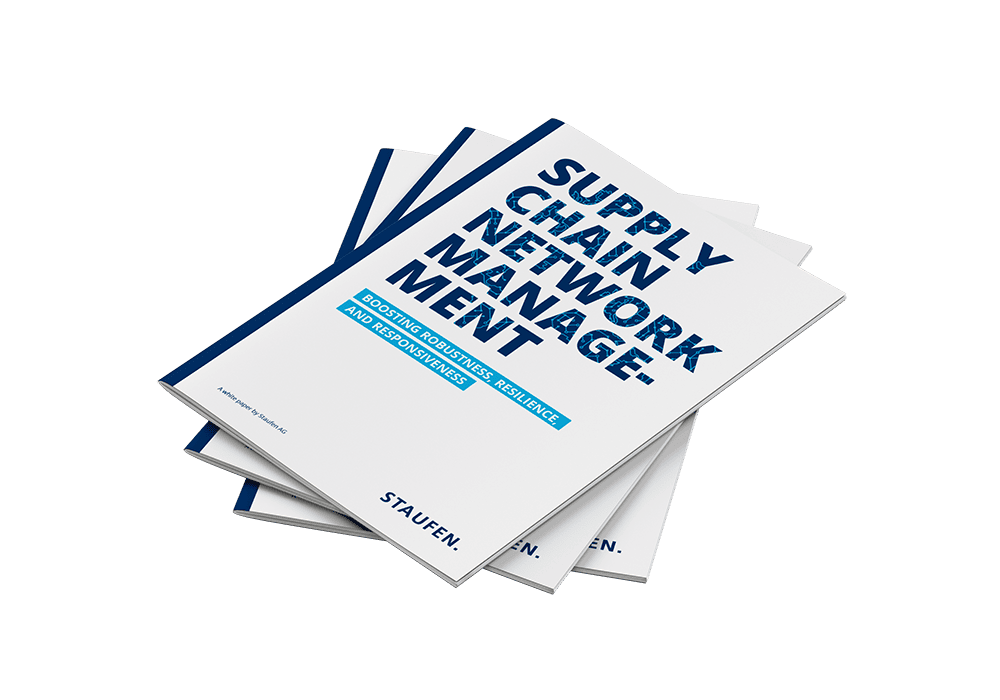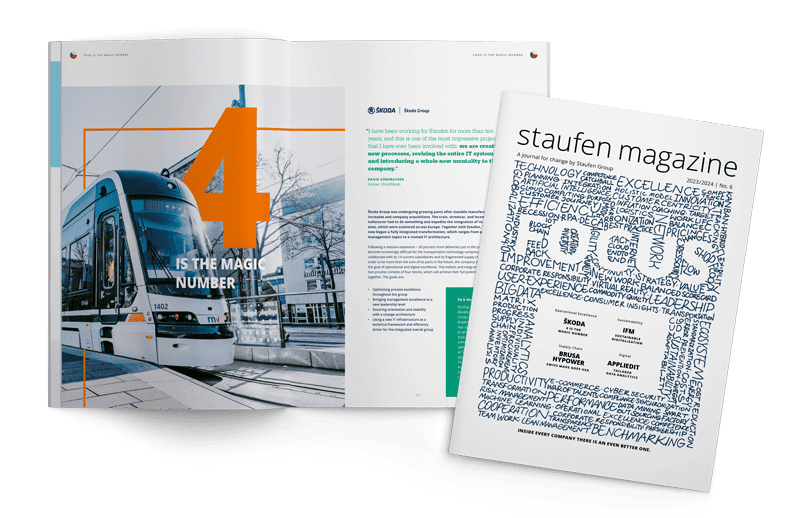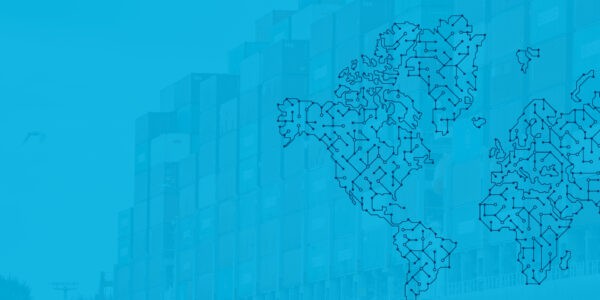
The past multi-crisis years have shown that focusing solely on the factors of time and costs does not go far enough. Only companies with a networked and actively controlled supply chain network will remain competitive in the future.
Currently and in the past, the supply chain is strongly cost-driven and for most companies global sourcing is an integral part of the purchasing strategy. ““Even before the multi-crisis, however, it had become apparent that this approach was no longer viable, and companies are once again pushing the local-for-local approach more strongly. The global value networks of many companies are too inflexible, intransparent and risk-prone to be able to react to threats and thus remain capable of delivering,” says Canan Jungel, Head of Supply Chain Network Management at Staufen.
Events such as the corona pandemic and the war in Ukraine have now relentlessly exposed the failings of manufacturers. The consequences were painful, ranging from delivery bottlenecks and production stops to damage to reputation and claims for damages. The results of the current Staufen study “Future Industry” paint a clear picture. “More than two thirds of the companies surveyed are currently not satisfied with their supply chain network,” says Staufen consultant Jungel.
Digitization of lean processes as a decisive lever
In view of the fact that the complexity in the value-added networks will continue to increase, companies fear a loss of competitiveness. Because negative effects and influences on the supply chain network cannot be avoided in the future either and lead to new challenges and bottlenecks to which no answer can be found with the classic “competitive priorities” alone.
But how can the efficiency of the network be sustainably increased? “This is only possible with the help of proactive supply chain network management. It knows the value chain, builds a resilient network and has strategies for risk avoidance and problem solving at hand,” says Prof. Dr. Christoph Glock from the Technical University of Darmstadt. In times when information in many companies is still recorded in Excel lists and forwarded by e-mail, work steps are error-prone and processes inefficient. In the event of a disruption, these companies then lose too much time.
The digitization of lean processes is a crucial lever for more resilience in the network. “If processes are digitized, problems can be identified and resolved earlier. Information is shared faster,” says the professor at the TU Department of Production and Supply Chain Management. Manufacturers could then make decisions based on data rather than relying on individual gut feelings. However, according to Glock, data quality is a problem in many cases. A suitable data strategy should therefore first regulate where data is collected, stored and processed.
Building on digitization, AI can offer further opportunities in the supply chain network. “Faults will then be easier to predict and identify, and artificial intelligence can also help prevent faults in advance or initiate automated countermeasures,” scientist Glock is convinced.

Canan Jungel
Principal
STAUFEN.AG

Canan Jungel
PrincipalSTAUFEN.AG
CURRENT AND FUTURE TRAININGS OF THIS TRAINER
III. Train-the-Trainer to become a lean trainer
Operational Excellence in SME | Albrecht Jung live
Material in flow | SEW-EURODRIVE live
II. Lean Logistics
I. Basic training as a Lean Expert
Canan Jungel was during her dual bachelor studies as an executive assistant for the international freight forwarding company Gerner + Kahle GmbH responsible for operational logistics improvements. As a master‘s degree candidate Canan Jungel contributed to the development and introduction of the Lean Logistics Seminar for Staufen Academy. Since 2014 Canan Jungel is working as an Lean Consultant and Trainer at the Staufen AG. Since then she is nationally and internationally implementing lean transformation projects with the focus for lean processes and lean logistics operations. Furthermore as a Coach she is implementing and stabilizing Shop Floor Management in various branches. Within the Staufen Academy she is responsible for trainings within the public program, internal qualification and international training standards. Besides that she designs and conducts successfully customer specific qualification and training programs.

Prof. Dr. Christoph Glock
Professor at the Department of Production and Supply Chain Management
Technical University of Darmstadt

Prof. Dr. Christoph Glock
Professor at the Department of Production and Supply Chain ManagementTechnical University of Darmstadt Read more
Supply Chain Network Management as a new networking platform in the company
In order for the supply chain network to function smoothly, it must also be connected to customers and suppliers. This is where Supply Chain Network Management takes on a new meaning in the company, where it has mostly played a subordinate role in the past: up until now, Purchase and Distribution has mainly been supposed to get percentages and sell products. Strategically positioned correctly, however, Supply Chain Network Management becomes a networking platform. It helps to advance the processes with the suppliers and clients to understand the customers even better.
Wingtra, a Zurich-based drone specialist, is impressive with its enormous growth rates. Purchasing is the central contact there for both the operational area and development. Purchasing is integrated into product development right from the start in order to leverage further efficiency potential later in the product cycle. The department standardizes contracts and defines clear replacement procurement rules. “Purchasing is also responsible for maintaining relationships with suppliers. We send the buyers to the key suppliers in order to better integrate their processes with ours,” says Marco Schicker, COO of Wingtra AG. The company uses its ERP system to initiate orders and define framework conditions.
For many other companies, however, networking with suppliers and customers has faded into the background during the multi-crisis. Only four out of ten decision-makers surveyed in the Staufen study stated that stronger control and networking with partners is currently a starting point for increasing efficiency.
Risk management identifies critical nodes
In any case, political, technological, environmental and social risk factors will continue to have a significant impact on supply chain networks in the future. According to Christoph Glock from the Technical University Darmstadt, companies also have to deal with disruptions in the value chain beyond global crises: “Risk management should proactively examine threats and not wait until problems have arisen, which can then only be solved with great effort.“ Companies that keep an eye on the entire value chain can identify critical nodes due to the transparency in their processes. This enables them to develop special security measures in order to be able to react more quickly to disruptions. “It is important to be aware of which risks are most critical for a company. Then you can decide whether and with what measures to react to individual risk factors,” says supply chain expert Marco Schicker from Wingtra AG. And with a better understanding of the most important corporate risks, employees would be able to make decisions much more independently in their day-to-day work.
At the same time, the value-added networks will change significantly over the next few years, says Supply chain and warehousing expert Glock: “We see a trend towards nearshoring in some industries; Firstly, because you want to reduce the risks of global value-added activities, and secondly, because you want to improve the sustainability of the value-added chain through shorter transport routes.” Digitization will also continue to influence value-added networks. TU Professor Glock: “But this certainly does not diminish the relevance of network management.”

White paper Supply Chain Network Management 2023
Boosting Robustness, Resilience and Responsiveness
What will the stable supply chain network of tomorrow look like? An answer to this and other questions can be found in our white paper.
Request the Magazine now as a digital or print version

YOU MIGHT ALSO BE INTERESTED IN

Tracking stability instead of a roller coaster ride
During the pandemic, all bicycle manufacturers struggled with supply chain problems, as the demand for e-bikes in particular increased dramatically. Flyer, a Swiss e-bike manufacturer, is now working on making its supply chain network more transparent and resilient.
Read more
AI in the supply chain network
Decentralized growth led to problems in the supply chain network at ABICOR BINZEL: the service quality and margin declined. The company utilizes a software to dismantle existing data silos and restructure data operations. This also benefits ABICOR BINZEL in the current multi-crisis. In addition, the cutting and welding torch manufacturer utilizes artificial intelligence in sales planning.
Read more
Supply Chain Network Management
Come sarà un supply chain network stabile nel futuro? Potrai trovare risposta a questa e ad altre domande nel nostro White Paper.
Read more

